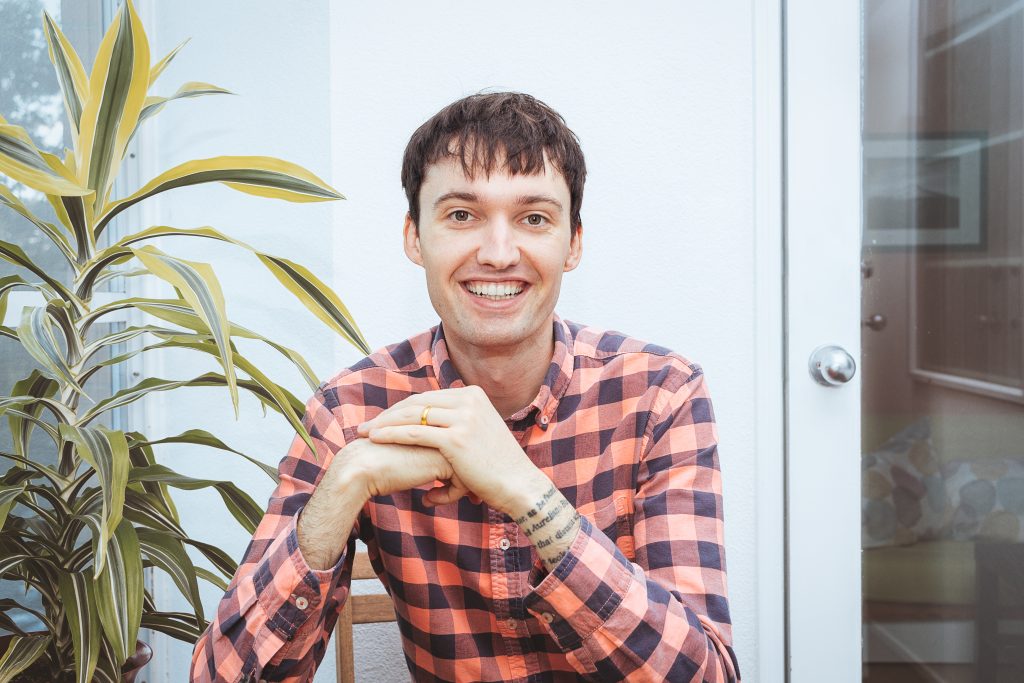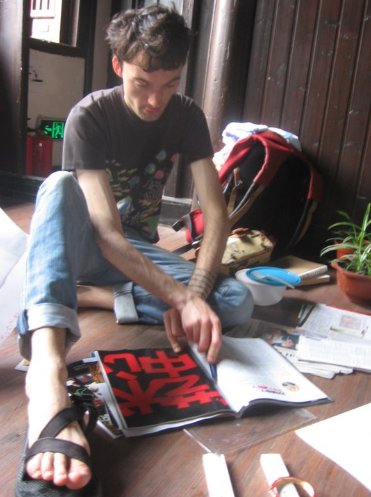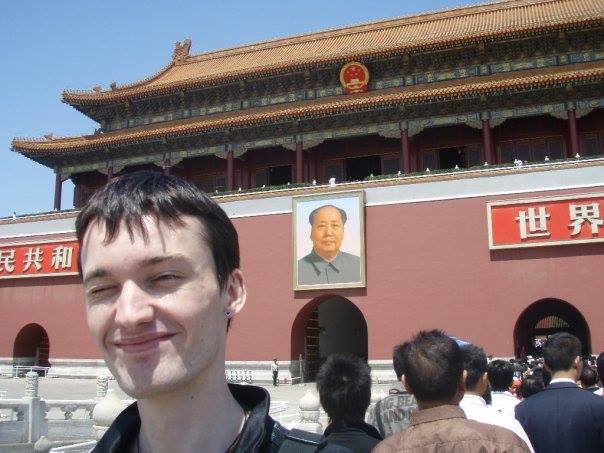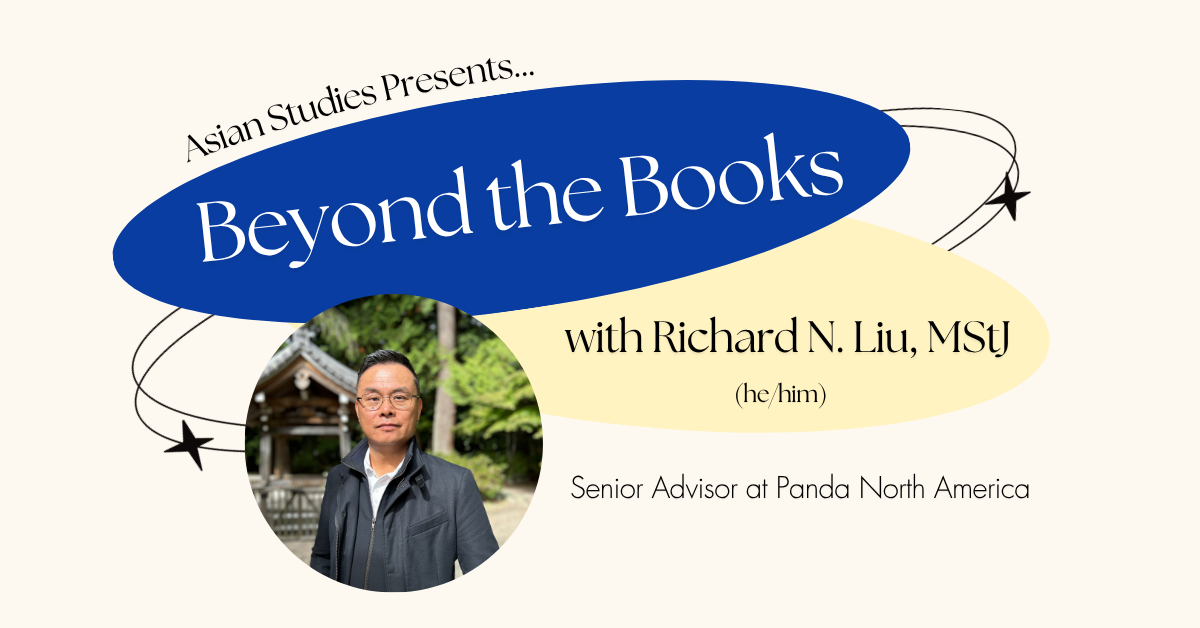The Alumni Spotlight is an interview series where we interview Asia Studies alumni about their career paths, how they became interested in Asian Studies and for any advice that would be useful to our students. This interview features Nick Stember, MA ’16, who works as a freelance Chinese to English translator in Vancouver, BC.


Tell us a little about yourself, your background and how you became interested in Asian Studies?
My first experience in Asia was a failed attempt to backpack from Bangkok to Yunnan after dropping out of high school. Basically, I ran out of money outside of Phnom Penh and ended up teaching English to monks and preschoolers. I wasn’t very good at it, I’m afraid! Growing up, my aunt got me into samurai movies and Chinese gardens—along with my uncle. The two of them have a small landscaping company, and she’s worked a lot on incorporating native PNW plants into East Asian-style junk gardens. That was my first job, moving rocks around and bonsaiing vine maples. My original major during my undergrad was comp sci, but I’ve always been a language nerd so I was taking French and Chinese on the side. I did a very cold year in Harbin to get away from doing tech support, which led to my decision to change majors to Chinese. When I got back to Portland State, I had the good fortune to be hired by Lisa Hatfield (now at OHSU) to teach Chinese in the Tutoring Center there, which was a pretty important development in my life, in terms of showing me that I could actually make a living as someone who geeks out on foreign languages.
While a student, was there anything you did to get ahead with your career? Or anything that you would recommend that other students do?
Well, I think first of all, I was really lucky to have the guidance that I did—PSU’s Chinese program is tiny, so when I was there I basically had two professors, Stephen Wadley and Jonathan Pease. They’re both pretty old school about things, which means they encourage their students to build a strong foundation in the language, from classic texts on up to soap operas and the like, and to definitely consider doing study abroad if you’re serious about learning the language. So even though our cohort was small, with maybe a half-dozen Chinese majors graduating around the same time I did, most of us went on to live and work in China or Taiwan, and a number of us ended up in graduate programs.
On a more personal level, I’m a big advocate of trying things out before you commit by taking out lots of debt or investing big chunks of time in one thing. Unpaid internships and volunteering can be a good way to get experience if you can afford to not work, or can squeeze them in on the side. Otherwise, as cliché as it sounds, I’d say I’ve learned something from every job I’ve done—how to manage time, how to manage people, how to manage customers. Although I’ve only worked as a translator for a couple of years now I often find myself falling back on skills that I learned from random jobs in my ‘misspent youth.’ And I sometimes get work through people that I met years and years ago. So building a network of people is just as important as polishing your CV. Early on I was reaching out to people like Brendan O’Kane, Eric Abrahamsen, and Jeremiah Jenne. The biggest thing is to put yourself out there—the worst thing that will happen is someone will say no, or maybe they’ll trash your work, but that’s just the cost of doing business, I think.


Nick Stember in his teaching attire.
How did you get your first “adult” job after graduating? Was it a simple transition?
My first job after graduating with my BA in Chinese was teaching English at a VIP cram school (even today, I still get people telling me that they saw me in ads on the Shanghai metro). It wasn’t a super exciting job, but it paid the bills for a couple of years and gave me the chance to keep working on my Chinese and also travel around a bit. It also helped prepare me to work as a teaching assistant. If your Chinese is still shaky, I wouldn’t recommend it for your first China experience, since it’s pretty hard to pick up a second language while teaching your first. If you’ve already picked up spoken Mandarin and just want to get back in the country though, there definitely are worse ways to spend your time.
After your first job, how did your career progress and what are you currently doing?
After two years of teaching English I started applying to grad programs in Asian Studies, which is how I ended up at UBC. Long story short, I applied to 14 programs, got accepted at 7 and funded at 3. Of those 3, Chris Rea’s research had the best fit with my interests. I finished my MA program last December, but I’d been doing translation gigs on the side since the summer of 2014 which is what convinced me to take some time to explore this career path rather than jumping straight into a PhD.
Last year I worked on a sample translation of a three-part novel that we pitched as the ‘Chinese Game of Thrones,’ and I finished a big 300-hundred page project for the Ministry of Culture (MoC) in Taiwan, putting together sample translations of manhua, with lettering and everything. Although we haven’t been able to find any publishers to sign off on full translations of anything yet, there’s been a lot interest so I’d say I’m cautiously optimistic that something will happen there, eventually. And I think the MoC was happy with the end product, because I’m actually in the middle of ‘Part II’ of that project right now.
In March this year, I was able to visit China for the first time in about three years, which was really fun. Paper Republic invited me to participate in a roundtable at the Beijing Bookworm Festival, which had always been on my bucket list, and I also got to give a short talk on translation at the Jia Pingwa Art and Culture Center in Xi’an. Thanks to that talk, they asked me to put together a project to publish sample translations of four of Jia’s best-known novels and get those out to publishers and critics, who are finally starting to show interest in his work. And I have a few other things making the rounds, plus the usual assortment of shorter assignments for my regular clients.
What do you enjoy about your current job? What are the challenges?
There are a lot of things to enjoy about being a translator: having the flexibility to set your own hours and pick your own projects, the mental challenge of doing something new every day, and the pride that comes with being able to share a really excellent translation of something cool with the English-speaking world. There are also a lot of challenges: finding and bidding on projects, convincing publishers to pay a living wage and also to take a chance on something unknown, and not letting your work take over your life.


Nick Stember hard at work
Are there opportunities for recent graduates in your industry? What does a typical entry-level position entail?
I think there are opportunities in my industry, but you’ll have to be creative if you want to find them. Depending on your language pair(s), you’ll have your own challenges and opportunities. There are a number of job boards for translation gigs, which can be a good way to start. For literary translation, Paper Republic is good place to get to know the community of Chinese to English translators. You won’t make a ton of money, but if you’re fast and reliable you’ll build up a client base, slowly but surely. At that point you can start raising your rates and being more selective about what you work on. Just a caveat though, literary translation is notorious for not being the sort of thing you want to quit your day job for, so be prepared to have other lines of work to fall back on when things get slow. For example, I also lead tour groups of Chinese students around North America, and some of my steadier work is in translating art criticism, not comics and short stories.
Has learning an Asian language helped you in your personal or professional life? What tips do you have for students who are keen to play the ‘language card’ in their career development?
Learning Chinese has absolutely helped me in both my personal and professional life, in a way that studying German, Spanish, and French did not (I made a valiant effort to learn Cambodian, but didn’t get far). That said, I’ve spent just over 1/3 of my life learning Chinese and I still feel like I have a lot to learn. There are probably faster and more lucrative ways to improve your career prospects than that, but if you enjoy learning languages there’s a lot to be said for the ‘life-long project’ of learning Chinese. Just make sure you have a back-up in case you find out translation / academia / language teaching isn’t your cup of tea.


Nick on his first trip to China in 2007
Do you have any other advice that you would like to impart to students and/or recent graduates?
Learn to fail well. Knowing when to stick with something that’s hard and unpleasant but will pay off in the future, and knowing when to cut your losses and pivot into something else is probably going to be the hardest thing you’ll ever have to learn how to do. Sometimes worst thing is to succeed, only to realize that you were chasing the wrong goal all along. Talk to people who are already doing what you want to do and see what they think about your plans, but don’t put your responsibilities on their shoulders. Whatever choices you make, you’re the one who’s going to have to live with them!


